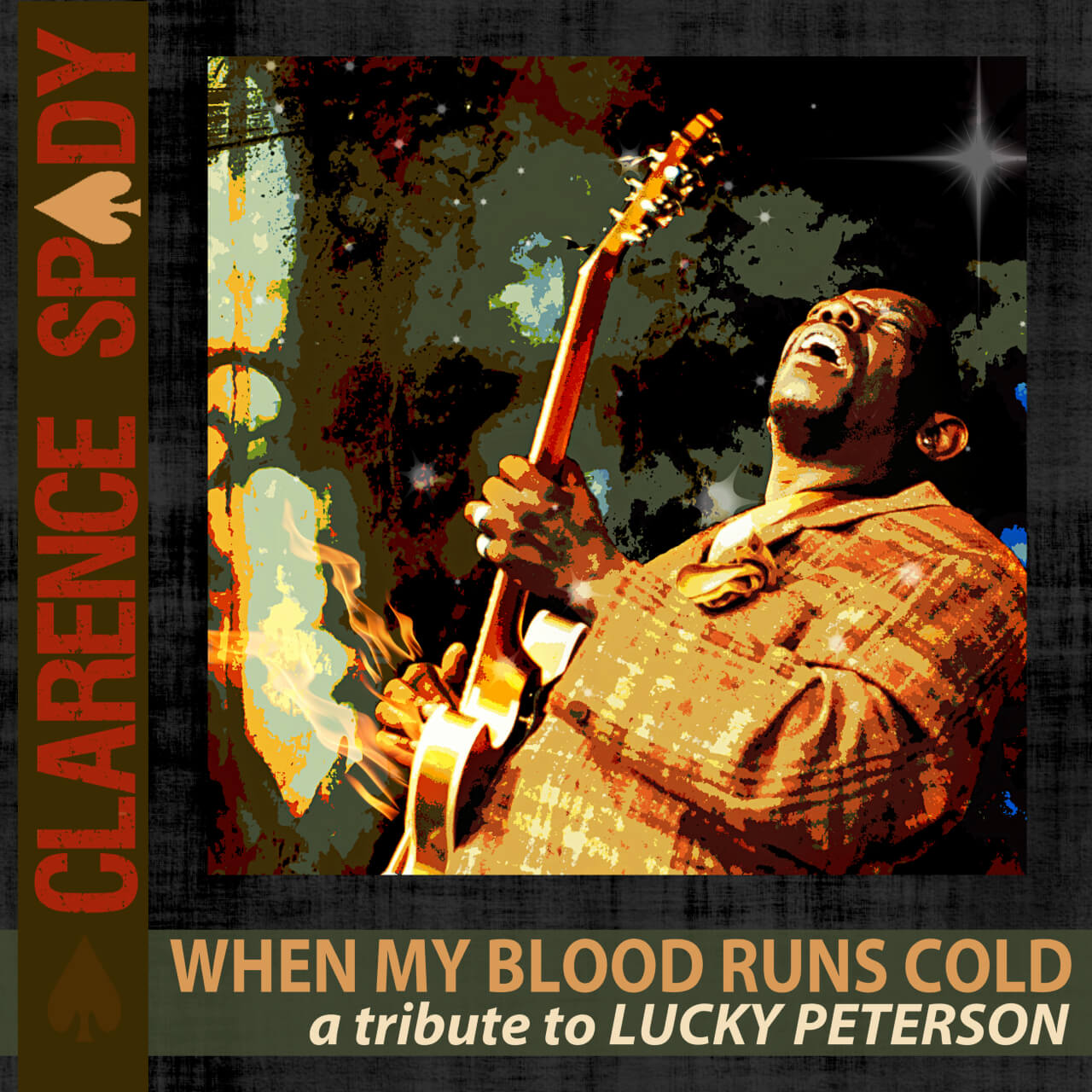Editor’s Note: The information on Clarence Spady and his relationship with the late Lucky Peterson was written by Chicago music journalist and historian Bill Dahl and is used here with his permission.
It doesn’t happen often.
Two musicians sharing some of the same influences and idiomatic interests — in this case, blues and soul — forge a special unbreakable bond that elevates them both to a higher plane. That’s exactly what transpired whenever Clarence Spady shared a stage with Lucky Peterson. Blue sparks flew every which way and the walls trembled as they wildly urged one another onward and upward, soaring to artistic heights that neither could have anticipated.

Clarence pays spectacular tribute to his longtime friendship with the late keyboardist/guitarist on his brand-new version of Lucky’s bone-chilling “When My Blood Runs Cold,” which Peterson premiered on his 2000 CD Double Dealin’. Spady first heard him perform the song at a club gig in New York City. “Lucky was sitting down playing,” remembers Clarence. “I said, ‘Man, I like that chord progression!’ And he sang ‘When The Blood Runs Cold.’ And it ran cold in my veins, because I couldn’t believe what I was hearing!”
The two were already good friends and musical compatriots by then. Clarence first heard of Lucky because his then-manager Scott Goldman ran a nightspot called Blues Street in Clarence’s homebase of Scranton, Pennsylvania during the 1990s. “His father, James Peterson, used to come to town. He was pretty much on the rotation at Blues Street. Anytime he was up north, and heading to say, New York, New Jersey, or New England, Blues Street was a pit stop,” explains Spady. “The first time he came, I sat in with him.
“And everybody was saying, ‘Oh man, he has to meet Lucky, James’s son!’
“We never crossed paths right away. It wasn’t until like maybe three or four years later, we did a festival. It was somewhere in the Midwest. And we met. And we laughed. And we joked. And we had a few drinks. And next thing you know, right then and there, the vibe was, ‘Wow! This is a cool guy! I dig this guy!’ And many encounters in New York, because he would come to New York and record a lot.”
One recording date early on set a lofty tone for their artistic relationship. “Me and Lucky were at that same session, and that was one of the times we recorded together,” says Spady. “I recorded a song, and he recorded a song for his project, and then we let the tape roll and we just started playing with the rhythm section. And it was insane. It was like one of those things. The magic can never happen the way it did.”
Judge Kenneth Peterson grew up immersed in the blues, embarking at a ridiculously young age on his musical career. The massive Hammond B-3 organ of Bill Doggett fascinated three-year-old Lucky, and pointers from Doggett and the incomparable Jimmy Smith steered him in the right direction. No less a blues expert than Willie Dixon pronounced Lucky ready to kick off his recording career at the tender age of five, when the wee lad cut “1-2-3-4” for the Today label. The single proved a national hit, leading to appearances on The Tonight Show, The Ed Sullivan Show, and Soul!. But dues remained to be paid. Lucky learned his trade as an organist for Little Milton and Bobby Bland before striking out on his own in 1989 with his Alligator CD Lucky Strikes!. Many more albums followed, Peterson embracing international blues stardom.
Lucky and Clarence shared other interests that were a bit more self-destructive. “I’ve struggled, and we kind of struggled in the same areas,” says Clarence. “At the time we were doing it, it wasn’t a struggle. It was a party. Then the struggle came afterwards.
“The last time we were together was the Rustic Roots Blues Festival in Lancaster, Pennsylvania, I’d say about three years ago,” says Spady. “He was on the bill, and I was on the bill, and I stopped over to his set because I was finished—his went on last, and mine ended. So we hung out, but this time it was just a hangout backstage, tossin’ it around. And this was one of those opportune times when I was in recovery at that point. So we didn’t get together like we had gotten together numerous times before.”
Those offstage interests never interfered with the music. “For somebody who didn’t use a pick, the riffs he could rip out of there—I didn’t think it was possible for the thumb to even move that fast!” marvels Clarence. “When I was down in Lancaster, he had the B-3 onstage, so he closed with the B-3. We did ‘I Wish.’ But just before he did ‘I Wish,’ he did a tribute to Jimmy Smith that just floored me. Then he closed with Stevie Wonder’s ‘I Wish.’ And he nodded to me, ‘Come on, grab the guitar! Grab the guitar!’ I said, ‘No, go ahead!’ ‘Grab the guitar!’ ‘No, go ahead!’ I know that song inside and out, but there wasn’t anything that needed to be done.”
Peterson died this past May 17, aged only 55. Clarence will never forget him or his brilliant musical flights, where no boundaries existed and they could sail to the stars. “He was a realist, and that made it real for me,” he says. “You’d ask him a question, he was real. ‘Man, where you from?’ He said, ‘The world!’ He said, ‘Thank God for my mama, ‘cause she brought me in the world!’ And I looked at him, like, ‘Wow, that’s a great answer! The world! That’s so true, man.’ He just had a great soul, and his personality, his mannerisms.
“He was a respectable gentleman.”
“When My Blood Runs Cold,” drops tomorrow, December 11th, via Nola Blue Records on all digital platforms.
Clarence Spady
*Feature image courtesy of Nola Blue Records

